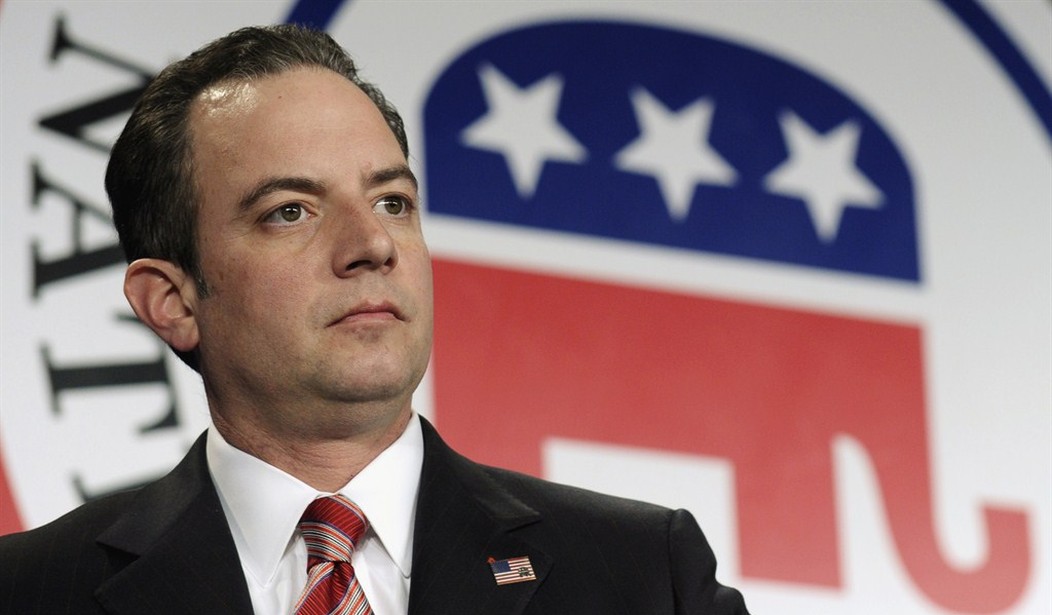THE MORNING after President Obama's State of the Union address, Politico had a story on how Republicans had responded to one contentious issue. The headline: "Priebus struggles to explain GOP immigration messages."
That would be Reince Priebus, the Republican Party chairman. His "struggle" was to clarify why Iowa's new senator, Joni Ernst, said nothing at all about immigration in her 10-minute reply to the president, whereas Florida Representative Carlos Curbelo, in a Spanish-language version of the GOP response, urged Obama to work with Republicans "to create permanent solutions for our immigration system, to secure our borders, [and] modernize legal immigration." Good thing Priebus wasn't asked about the formal Tea Party response to the president's speech, delivered by another Florida Republican, Rep. Curt Clawson, or he'd have had still more reason to squirm. Speaking in English and Spanish, Clawson called pointedly for "embracing … legal immigrants, and the millions waiting in line legally to begin their own American Dream."
Then there was Iowa Representative Steve King's rude Twitter slam against Obama for inviting "a deportable" to sit in the House gallery as a guest of the First Lady. That was a reference to 20-year-old Ana Zamora, a Texas student who was brought illegally to the United States as an infant, and who benefited from Obama's 2012 executive order indefinitely extending legal status to thousands of similarly situated immigrants.
Though King's tweet wasn't an official GOP statement, it created some instant awkwardness for the Republican presidential hopefuls heading to Iowa for a Saturday "freedom summit" hosted by … King. When one of those hopefuls, Senator Marco Rubio, was asked about King's nasty tone, his answer was careful: "We have to always remind ourselves that we're talking about human beings with hopes and dreams and families."
Recommended
Plainly, the clearest element of the GOP message on immigration is that the GOP has no clear message on immigration. The subject was barely mentioned in the president's address, but that didn't stop the loyal opposition from once again getting into an intramural tangle over it.
But is that a bad thing?
For any large political party, a boisterous battle over policy and principle is a sign of fitness, not feebleness. While "diversity" is a sacred cow on the left, it is on the right where real diversity — diversity of ideas and viewpoints — has most often been showcased. In the 1970s, Ronald Reagan famously debated William F. Buckley Jr. on whether the United States should relinquish the Panama Canal. In the 1980s, Bob Dole and Newt Gingrich fiercely clashed over supply-side tax cuts. More recently, Republicans have gone at each other over war in Iraq, education reform, and "enhanced interrogation."
However disconcerting in the short run, the right's current rumble over immigration policy is heartening, especially when the argument focuses on ideals and values, and reflects a thoughtful interest in crafting wise, not merely popular, public policy. In a new monograph from Encounter Books — "Open Immigration: Yea & Nay" — Mark Krikorian of the Center for Immigration Studies and Alex Nowrasteh of the Cato Institute provide a brief yet splendid example of how uplifting the debate over immigration can be.
Each lays out his case in prose that is clear, quick, factual, and respectful.
Krikorian, a well-known immigration restrictionist, argues that while mass immigration may have suited the United States in the 19th-century, it is harmful in the 21st-century. It poses security and economic threats, undermines assimilation, and retards productivity gains by flooding the market with cheap labor. "A modern society doesn't actually need any immigration," he writes; his proposal would slash the annual influx from 1 million to about 400,000 — "still higher than any other nation in the world."
Nowrasteh, by contrast, wants more legal immigration. America isn't being swamped with newcomers — far from it. As a fraction of our population, immigrant inflows are small compared to most developed countries. Every policy generates stresses and strains, he notes, but there is no question that immigration enlarges the US economic pie. "A freer immigration system would not only be economically beneficial to the United States," Nowrasteh argues. "It would also be consistent with our principles of limited government, free markets, and individual liberty."
These dueling essays are a pleasure to read. Each advocate strengthens his case, paradoxically, by granting that the other side raises serious challenges and attempting to meet them. To be sure, Krikorian and Nowrasteh aren't politicians, ravenous for votes and approval ratings. But their debate exemplifies what is possible even on such an incendiary issue.
It's true: Republicans and others on the right, battling it out over immigration, seem awfully fractious and confused these days. For those who take their ideas seriously, that's often how the democratic process works.

























Join the conversation as a VIP Member